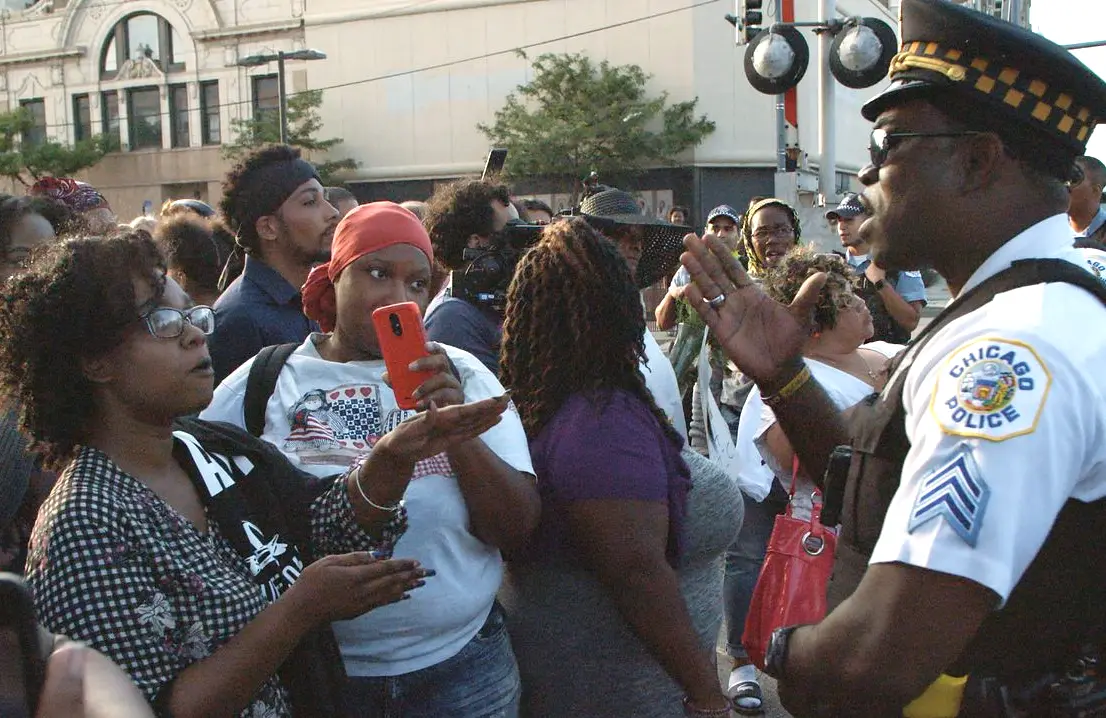Chicago Gets the Hoop Dreams Treatment in City So Real
-
 Protestors confront a police officer in a scene from City So Real. (Photo: Kartemquin Films/National Geographic)
Protestors confront a police officer in a scene from City So Real. (Photo: Kartemquin Films/National Geographic)The editor-in-chief of the daily newsletter Best Evidence, Sarah D. Bunting knows a thing or two about true crime. Her weekly column here on Primetimer is dedicated to all things true-crime TV.
City So Real, National Geographic's new five-part docuseries from Steve James, is a chronicle of Chicago and the many cities within it, all set against the backdrop of its chaotic 2019 mayoral contest. Before I tell you why you should watch it (and you should), let me first present some "oppo research" that might suggest you shouldn't. I'll start with those five parts, because City So Real is long — five and a half hours total. That's a huge time commitment for non-Chicago residents, who may think the project doesn't have much to do with thier own lives. Meanwhile, Chicagoans themselves may not feel James's take on their recent history has anything new to show them.
To be sure, it's not always an easy sit. One of the things that makes Steve James a great filmmaker is his willingness to let uncomfortable moments play out; Hoop Dreams and James's 30 For 30 installment on Allen Iverson both contain any number of discomfiting moments, and almost the entirety of 2002's Stevie is uneasy watching. City So Real is no different. Whether it's then-candidate Lori Lightfoot going door-to-door during her campaign, enduring awkward interactions with prospective supporters; an unhoused lady serenading diners at a coffee shop with a Christmas carol as they sit with frozen smiles; radio host Maze Jackson playing 16 gunshots to drive home the horror of Laquan McDonald's death; or Lyft driver Tracey Champion, who wears a Care Bears onesie as she starts to cry recalling a racist jackass shouting at her for double-parking, City So Real can at times be painful to watch.
And that's before the final episode jumps forward to 2020 and comes to focus to the effects of the pandemic and a nationwide racial justice movement on the Windy City. Prior to that, the series documents a lot of retail-politics and party-machine gear-grinding, which, with just a week to go until this election, may be more polling and rallying than some citizens can take as we live through one of the most exhausting election seasons in history.
I get it, and I'm not here to talk anyone out of turning to the Food Network instead — but whether you watch it now, or in a few weeks or months from now, City So Real is worth the trip.
Yes, it's long, but The Vow is even longer, you had to wait a week for a new episode, and that series kind of fell apart towards the end in a way City doesn't. Yes, it's singularly focused on Chicago, but Chicago's struggles are ones all cities and people face, and James spends enough time with his subjects to make you feel like you know the city and the communities within it. And yes, despite being the focus of this column, it's not entirely a true-crime series,. Instead, like some of the greatest entries in the genre (OJ: Made In America comes to mind) it situates a crime in its larger historical and social context — in this case the murder of Laquan McDonald; racial injustice and police brutality; and, well, Chicago politics, a phrase nearly synonymous with cartoonish municipal corruption.
If you only have time for one of these offenses, and you require a higher case-to-runtime ratio, I can recommend 16 Shots (on McDonald's killing and the aftermath) or Street Fight (on Cory Booker's run for mayor of Newark, NJ), but I'll never not recommend Steve James; he's an excellent explainer and a close and curious listener, exactly what a project with this kind of reach needs. (The editing is pretty great too; James and co-editor David E. Simpson always know when to go to a reaction shot, and there's one gorgeous cut from an on-site TV reporter yawning hugely before a 6:00 AM standup take, to his blandly tight smile as he waits for the throw from the studio.) Yes, we've all reached our breaking points with politics and debates, but City So Real is wonkily compelling: with all the information of an Aaron Sorkin project, but none of the smugness.
A lot of documentary projects that began their narrative lives before quarantine can feel remote from the way we live now. City So Real captures a world and a time we still recognize; it seems "closer," in the stories it tells and the narrators it centers. You have every reason not to make room for it in your viewing schedule — but you also have every reason to carve out a place for it on your DVR or Hulu watchlist. I think it's earned your vote.
All five episodes of City So Real air on National Geographic October 29th, beginning at 7:00 PM ET. The entire series drops on Hulu Friday.
Sarah D. Bunting co-founded Television Without Pity, and her work has appeared in Glamour and New York, and on MSNBC, NPR's Monkey See blog, MLB.com, and Yahoo!. Find her at her true-crime newsletter, Best Evidence, and on TV podcasts Extra Hot Great and Again With This.
TOPICS: City So Real, National Geographic, Lori Lightfoot, Steve James, Documentaries, True Crime